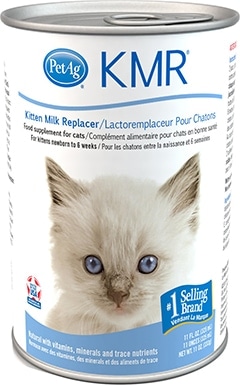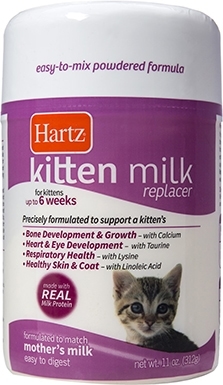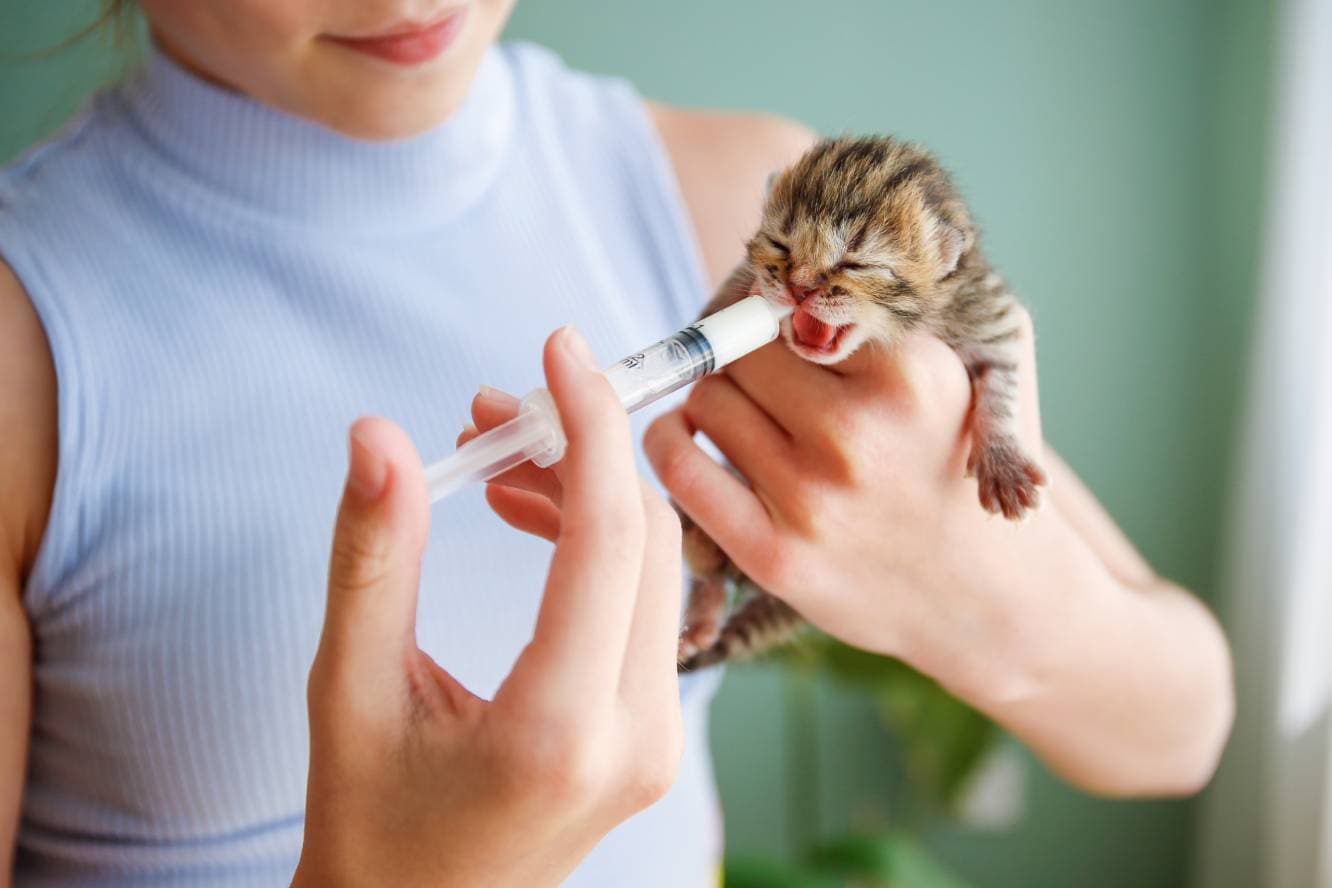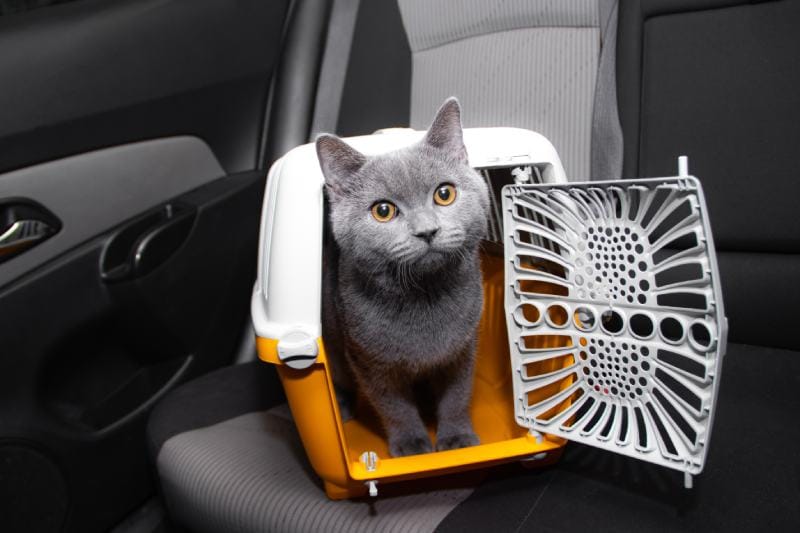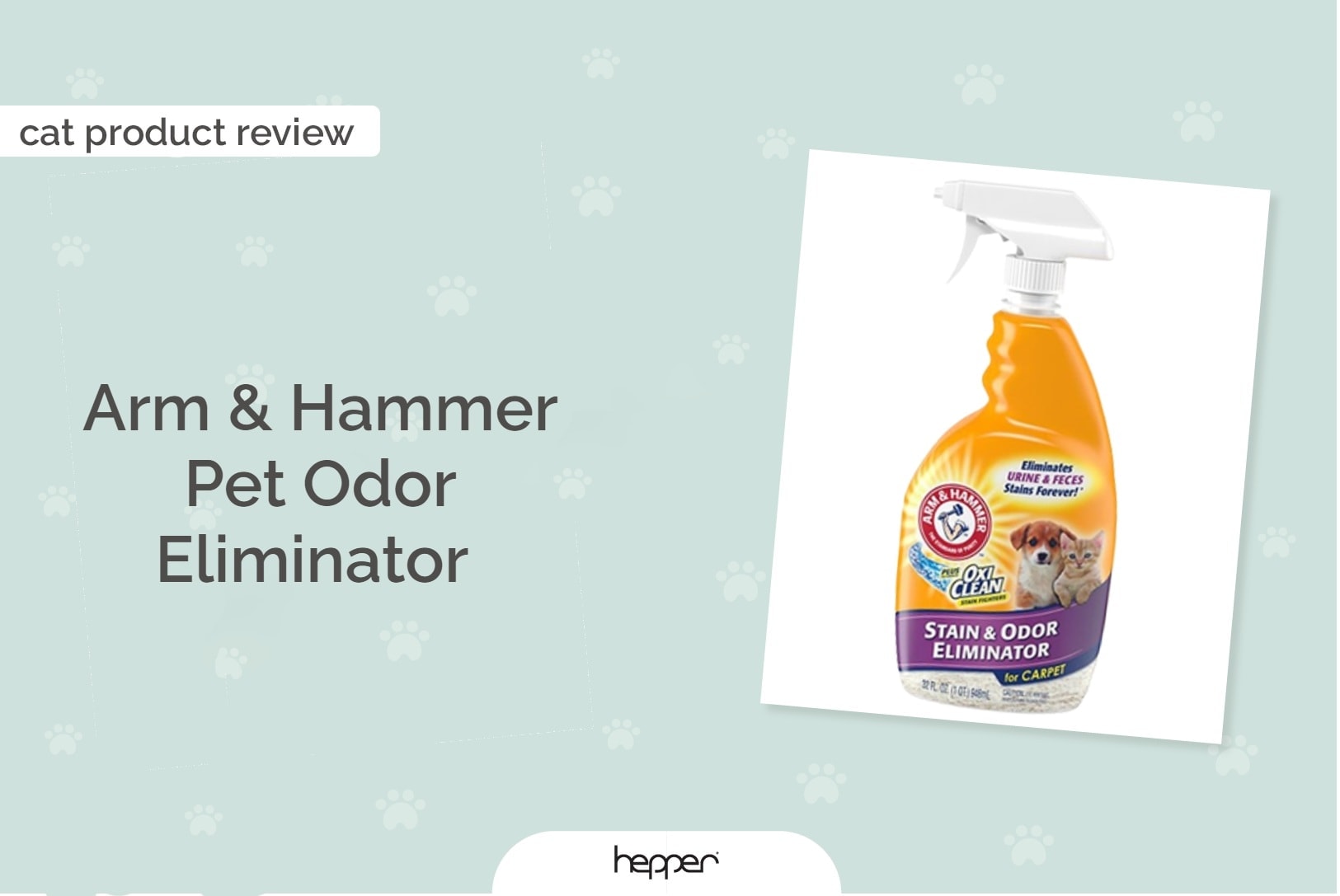8 Best Kitten Milk Replacers – 2024 Reviews & Top Picks
By Ed Malaker
Updated on
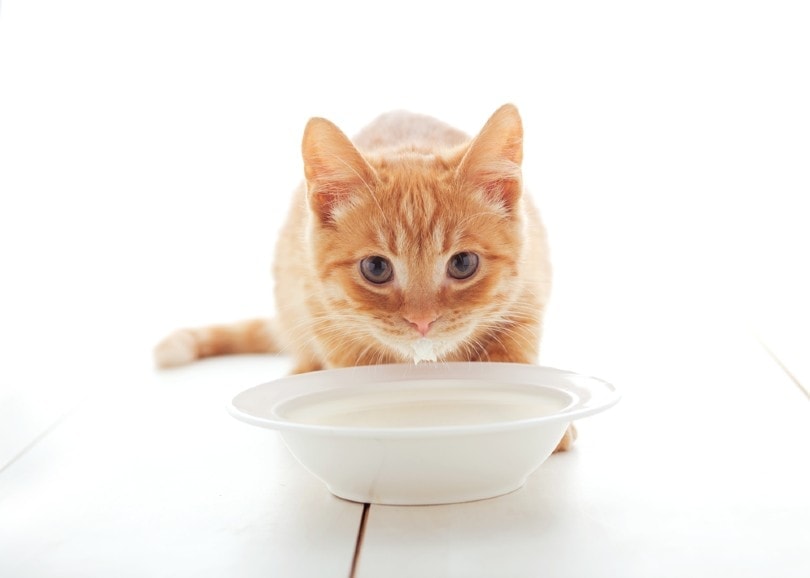
If you have found yourself with a kitten that is too young to be away from its mother, you will need to provide a milk replacer until it’s at least 4–5 weeks old. However, finding the best one for your kitten with so many brands available can be challenging. We’ve chosen eight brands to review so you can learn more before buying. We’ll give you the pros and cons of each one, and we’ve also included a short buyer’s guide where we take a close look at milk replacers to see what you should look for if you continue to shop.
Keep reading while we look at the size, ingredients, ease of use, and more to help you provide the best nutrition for your baby kitten.
A Glance at Our Winners in 2024
| Rating | Image | Product | Details | |
|---|---|---|---|---|
| Best Overall |

|
Nutri-Vet Kitten Milk Replacement |
|
Check Price |
| Best Value |

|
PetAg KMR Kitten Milk Replacer |
|
Check Price |
| Premium Choice |

|
Thomas Labs Goat Milk Replacer |
|
Check Price |

|
Hartz Kitten Milk Replacer Powder |
|
Check Price | |

|
Breeder’s Edge Kitten Milk Replacer |
|
Check Price |
The 8 Best Milk Replacers
1. Nutri-Vet Kitten Milk Replacement Powder – Best Overall
Nutri-Vet Kitten Milk Replacement Powder is our pick for the best overall milk replacer for kittens. It uses powdered whey protein to supply your pet with the nutrients it needs to develop strong bones and have plenty of energy. Nutri-Vet’s Opti-Gut is a special blend of prebiotics and probiotics that will help regulate your kitten’s digestive system and reduce the occurrence of constipation and diarrhea. The 12-ounce container makes 36 ounces of replacement milk.
The only thing we can think of to put as a con is that you need to mix it with water before feeding it to your cat, but it is to blend, and it won’t separate while the kittens are drinking it.
- Whey protein concentrate
- Nutri-Vet’s Opti-Gut blend included
- Makes 36 ounces
- Requires mixing
2. PetAg KMR Kitten Milk Replacer Liquid – Best Value
PetAg KMR Kitten Milk Replacer Liquid is our pick as the best kitten milk replacer for the money. It’s suitable for kittens, stressed cats, and even seniors. It has a similar amount of energy-providing protein as mother’s milk, and it comes pre-mixed so you can serve it as is. It uses real milk protein as well as eggs to make sure your cat has the nutrients it needs to grow into a healthy cat. Most cats seem to enjoy this milk and lap it right up. Each container provides 11 ounces of milk replacer.
The downside we found while researching PetAg KMR was that it gave a few kittens gas and loose stools.
- Perfect for kittens and stressed cats
- It closely matches mother’s milk
- No mixing
- Can cause gas and loose stool
3. Thomas Labs Goatalac Goat Milk Replacer Supplement – Premium Choice
Thomas Labs Goatalac Goat Milk Replacer Powder Puppy & Kitten Supplement is our premium choice milk replacer for kittens. It uses natural goat’s milk to create a protein-rich milk substitute not that different from a cat. It provides digestive enzymes and immunoglobulins to boost your kitten’s immune system to help them fight disease. It’s a powdered supplement, and each 12-ounce container will make 36 ounces of milk.
According to customer reviews, most cats loved Thomas Labs and would quickly come running when some was put out. The only problem we had was that it’s a little more expensive than most other brands, and you need to mix it, but each batch can stay good in the refrigerator for up to 24 hours.
- Digestive enzymes and immunoglobulins
- Natural goat milk
- Makes 36 ounces
- Expensive
- Requires mixing
4. Hartz Kitten Milk Replacer Powdered Formula
Hartz Kitten Milk Replacer Powdered Formula is a high-protein milk replacement product that uses real milk as its base to provide your kitten with milk similar to what it would get naturally. It’s a powdered product that is easy to mix with room temperature water and has a long shelf-life in the package. Each container makes 22 ounces of replacement milk.
The biggest problem we had with Hartz is that it contains the harmful chemicals BHA and BHT, which can potentially cause health problems for your cat later in life. There is also no scooper provided with it, so you’ll need something to measure the correct amount.
- High in protein
- Easy to mix
- Easy to digest
- Contains BHA and BHT
- No scooper included
5. Revival Animal Health Breeder’s Edge Foster Care Feline
Revival Animal Health Breeder’s Edge Foster Care Feline replacement milk is perfect for someone who regularly deals with orphaned or abandoned kittens that need a milk replacement. Each package contains 4.5 pounds of powdered milk replacement, and you will mix each teaspoon of powder with 2 teaspoons of water, providing you with more than enough milk for several kittens. It has taurine fortification, which is essential to cats, and there is almost no lactose, so it shouldn’t cause problems with gas or diarrhea.
Unfortunately, Revival Animal Health is another brand that contains the potentially dangerous chemical preservatives, BHA and BHT, which we like to avoid, especially with small kittens. We also noticed it has a bit of a sandy texture compared to other available brands.
- 5 pounds
- Low lactose
- Fortified with taurine
- Contains BHA and BHT
- Sandy texture
6. Tailspring Milk Replacer for Kittens
The Tailspring Milk Replacer for Kittens is another brand that uses goat’s milk to provide a healthy substitute for a mother’s milk. All ingredients are human-grade, and there are no harmful chemical preservatives or artificial dyes. Each can makes 24 ounces, and customer’s cats seem to enjoy it. It’s also suitable as a treat and works wonders helping senior cats maintain a balanced digestive system.
We feel good about providing Tailspring Milk Replacer to cats, but it has a strange odor, and a few kittens didn’t like it and wouldn’t drink any according to some customers.
- Human grade ingredients
- Natural goat milk
- Makes 24 ounces
- Some cats don’t like it
7. PetAg PetLac Liquid for Kittens
PetAg PetLac Liquid for Kittens is an easy-to-use formula that comes pre-mixed, so all you need to do is put a small amount in a saucer and store the rest in the refrigerator. It uses real milk as a base for the highest possible nutrition and the closest approximation to what your cat would receive in the wild.
Petlac is the second milk supplement on our list from PetAg because they make great products that don’t contain any harmful ingredients. However, this brand could cause some gas and even diarrhea in your kitten, and once you open the package, you will need to use it or discard it.
- 32 ounces
- No mixing required
- Real milk
- Can cause gas
- Short shelf life
8. Simply Kind Hearted Cat Milk Replacement Food for Kittens
Simply Kind Hearted Cat Milk Replacement is a powdered supplement that uses high-quality whey protein from real milk to provide your kitten with the nutrition it needs to grow into a healthy cat. It contains plenty of vitamins and minerals, like vitamins A, E, and B12, along with biotin, calcium carbonate, and more. It also provides your kitten with the essential nutrient taurine which is critical for a cat’s vision and must come from a food source.
The downside to Simply Kind Hearted Cat Milk Replacement is that it can be exceptionally hard to mix because you need to mix it with hot water and then allow it to cool to a temperature suitable for your cat. We found that it begins to separate as it cools, and it didn’t look too appetizing to kittens and some would not drink it as a result. The container only holds 7.5 ounces of the milk replacement powder, which is not very much and only suitable for one cat.
- Contains taurine
- Real milk
- Fortified with vitamins and minerals
- Hard to mix
- Small container
Buyer’s Guide: Choosing the Best Kitten Milk Replacer
Let’s look at some of the most important things to consider before choosing your next cat meal replacement.
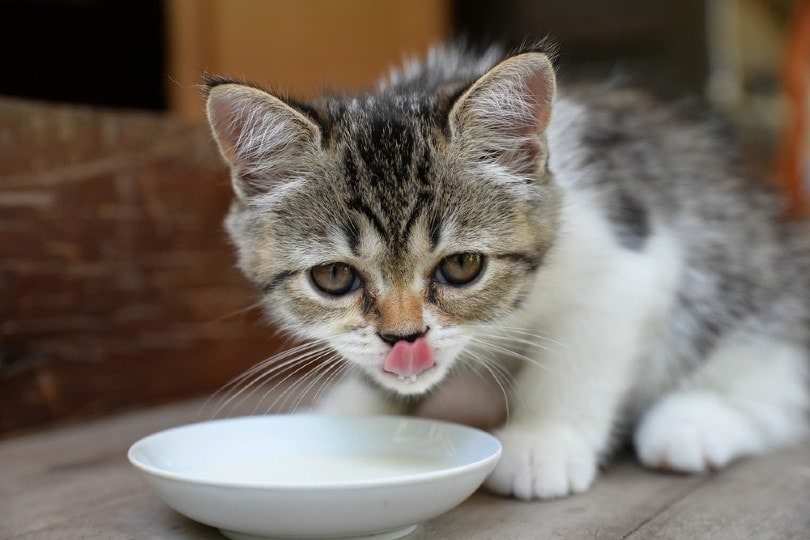
Powdered versus Liquid
Liquid
One of the first questions you will need to ask yourself when choosing your next milk replacement is whether to purchase a powder or a liquid. Each method has pros and cons. The liquid replacement is easy to use. There is no need to worry about ratios or mixing the correct amount of water. The only thing you will need to do is keep it refrigerated after opening. The downside to these brands is that they are usually more expensive because you need to pay for the water you would have added, which means bulkier packaging and higher transportation costs.
These additional expenses also make it worse for the environment. Another problem with already-prepared milk replacers is that they have a short shelf-life compared to powders, especially once opened, which means you will likely be throwing some away that you could have saved for another cat.
- Easy to use
- More expensive
- Short shelf life
Powder
You will need to mix the product with water when using a powdered milk replacer, so the packaging is much lighter, and you get a lot more milk from the same size container. It also has a much longer shelf life, so you can store the unused portion for a cat that might need it in the future, and it doesn’t take up any space in your refrigerator. However, it’s not without its downsides. Each brand uses a unique formula, and some mix well while others don’t. Some even require you to heat the water to add the product before allowing it to cool so you can serve it to your cat.
- Longer shelf life
- Better for the environment
- Less expensive
- Requires mixing
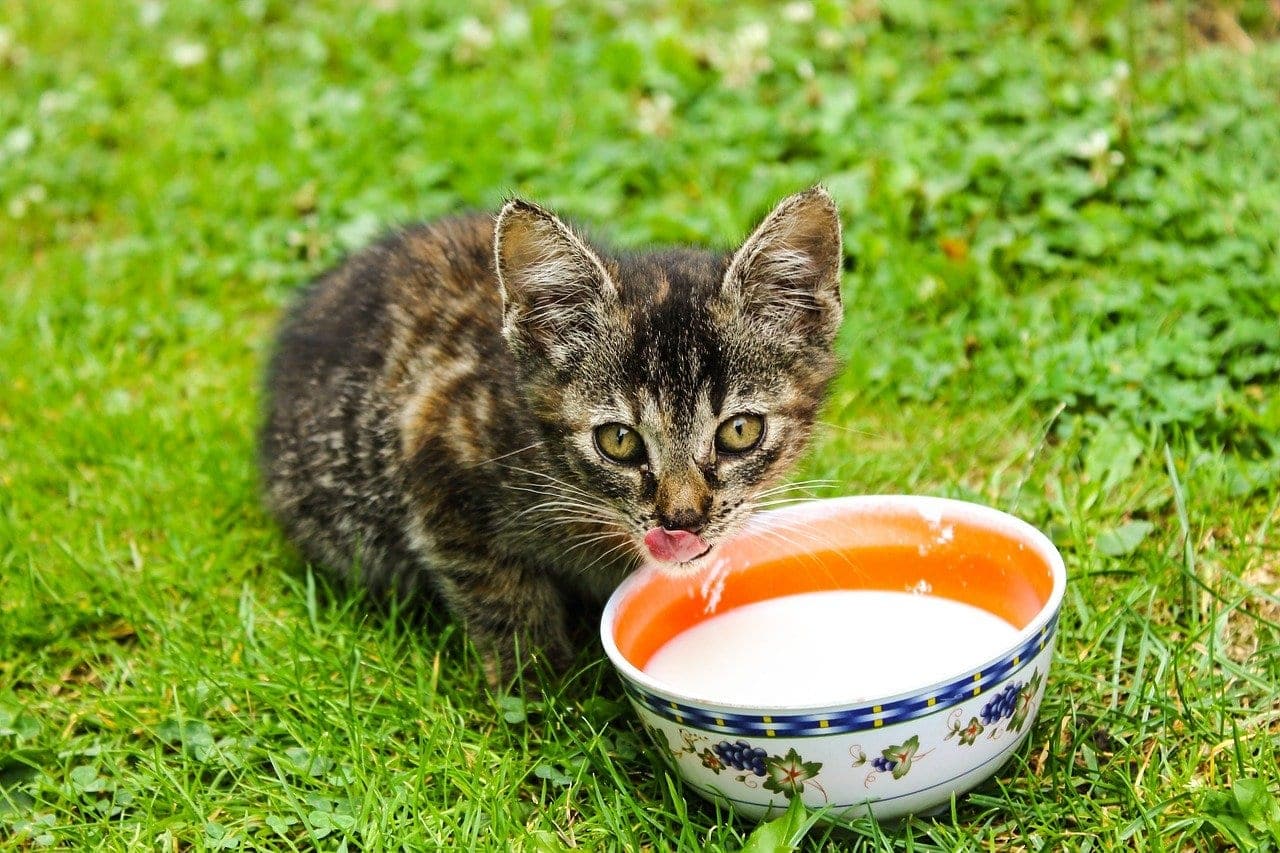
Lactose
A feline mother’s milk is mostly water and contains very little lactose. Lactose is an ingredient that many humans have a hard time digesting, and it affects cats in the same way. Some experts suggest that more than half of cats can have intestinal distress that causes flatulence, loose stools, and diarrhea after drinking products with too much lactose. Lactose in mother’s milk is around 5%.
Cows milk has plenty of lactose and will likely cause digestive issues, loose stools, and even diarrhea if they drink too much in one sitting. Goat milk has much less lactose but still plenty more than regular cat milk. If you notice your cat having gas or soft stools when drinking cow milk, we recommend trying a brand that uses goat milk to see if there is an improvement.
Fat
The fat content of mother’s milk is also very low, while cow’s milk can be quite high, especially if you don’t choose a low-fat variety. Goat milk has a slightly higher fat content. Too much fat in the diet can lead to weight gain and obesity, which is already a major concern for cats across the United States, with more than 50% of household cats being overweight by the time they are 5 years old. Obesity can lead to multiple health problems for your can, including life-threatening diseases, so monitor your pet’s weight closely as it grows so you can make the proper adjustments.
Vitamins and Minerals
There are several vitamins and minerals in milk that are good for your kitten, including vitamins A, C, D, and E, as well as important B1, B2, and B6, and of course, calcium. While both goat and cow’s milk will provide your cat with plenty of nutrients, goat’s milk is higher in vitamin A, an essential element for cats.
Taurine
Taurine is another essential nutrient that cats need but can’t make themselves, so you must make sure to feed foods that contain it. Most cats will get the taurine they need from eating meat proteins like turkey, chicken, and fish. However, you can also find taurine-fortified milk replacements that can help boost levels in your pet. Taurine is essential for good vision, digestion, strong heart muscles, fetus development, and more.
How Long Do I Need to Feed My Kitten a Milk Replacement?
Week 1
Your tiny kitten will still have closed eyes and ears and will require the milk replacement fed in a bottle for about 45 minutes every 2–3 hours. Since the kittens are so small, it’s best to have only one or two people doing the feeding to help the cat feel more secure without its mom. We recommend choosing someone with a lot of free time.
Weeks 2 and 3
You will be doing more of the same during week 2 and week 3. Your cat will start to eat slightly more and, by the end of the third week, should weigh more than 10 ounces and be spending its first few days exploring and playing.
Weeks 4 and 5
By weeks 4 and 5, your new kitten should be feeding quite a bit, and you will usually want to switch to a small bowl of milk replacement instead of the bottle if you haven’t already. By the end of week 5, it should weigh around 1 pound, and the kitten can start eating a small amount of solid food mixed with water or milk replacement.
Weeks 6, 7, and 8
During these three weeks, your cat will continue to eat less and less meal replacement, and you should reduce meals to three times a day while adding less and less water to the solid food.
After 8 Weeks
Once your cat is 8 weeks old, it should be on a normal solid food diet. We recommend crunchy kibble as it helps keep the cleaner by scraping away tartar, but a few more weeks of wet cat food won’t hurt them if you find your kitty is having trouble transitioning. Your kitten might also come looking for its milk replacement, and you can let it have some on occasion but try to wean them off as many cats lose what little ability to digest lactose, and you might notice your cat having frequent gas or diarrhea.
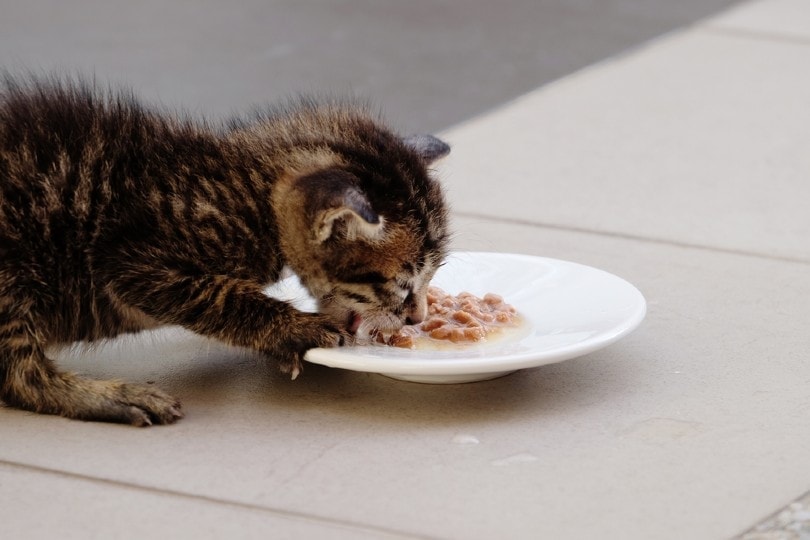
Conclusion
When choosing your next milk replacement for kittens, we highly recommend our pick for the best overall. The Nutri-Vet Kitten Milk Replacement Powder provides you with a large container of whey protein-based milk to feed your kitten. It’s also fortified with Nutri-Vet’s Opti-Gut probiotics that can help your cat keep a balanced digestive system, so there is less risk of gas or diarrhea. Another great choice is our pick for the best value. PetAg KMR Kitten Milk Replacer Liquid has a formula similar to mother’s milk at a low cost. It comes pre-mixed, so you can use it immediately.
We hope you have enjoyed reading over these reviews and buyer’s guide, and it has helped answer your questions. If we have helped you feel better about nursing a baby to health, please share these eight best kitten milk replacers on Facebook and Twitter.
- Related Read: Can Cats Drink Lactose-Free Milk? What You Need to Know!
Featured Image Credit to: Alena Ozerova, Shutterstock





